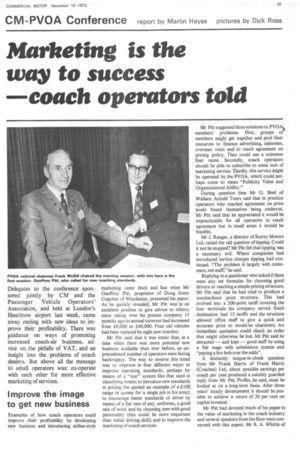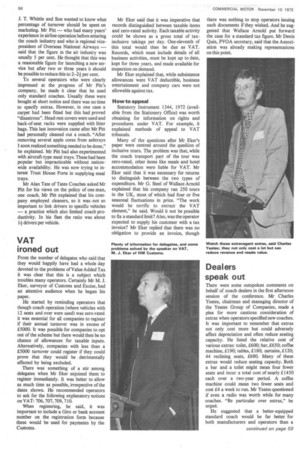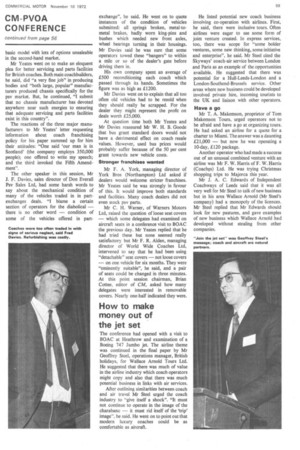Marketing is the way to success —coach operators told
Page 57

Page 58

Page 61

If you've noticed an error in this article please click here to report it so we can fix it.
Delegates to the conference sponsored jointly by CM and the Passenger Vehicle Operators' Association, and held at London's Heathrow airport last week, came away reeling with new ideas to improve their profitability. There was guidance on ways of promoting increased coach-air business, advice on the pitfalls of VAT, and an insight into the problems of coach dealers. But above all the message to small operators was: co-operate with each other for more effective marketing of services.
Improve the image to get new business
Examples of how coach operators could improve their profitability by developing new business and introducing airline-style
marketing came thick and fast when Mr Geoffrey Pitt, proprietor of Doug Jones Coaches of Winchester, presented his paper. As he quickly revealed, Mr Pitt was in an excellent position to give advice to others; since taking over his present company 15 months ago its annual turnover had increased from £8,000 to £40,000. Four old vehicles had been replaced by eight new coaches.
Mr Pitt said that it was ironic that, at a time when there was more potential new business available than ever before, an unprecedented number of operators were facing bankruptcy. The way to reverse this trend was to improve in four different ways: to improve operating standards, perhaps by means of a "star" system like that used in classifying hotels; to introduce new standards in pricing (he quoted an example of a £.100 range in quotes for a single job in his area); to encourage better standards of driver by means of a flat rate of pay, uniforms, a good mix of work and by choosing men with good personality (this could be more important than initial driving skill); and to improve the marketing of coach services.
Mr Pitt suggested three solutions to PVOA1 members' problems. First, groups of members might get together and pool their resources to finance advertising, salesmen, overseas visits and to reach agreement on pricing policy. They could use a common fleet name. Secondly, coach operators should be able to subscribe to some sort of marketing service. Thirdly, this service might be operated by the PVOA, which could perhaps come to mean "Publicity Value and Organizational Ability."
During question time Mr G. Steel of Wallace Arnold Tours said that in practice operators who reached agreement on price levels found themselves being undercut. Mr Pitt said that he appreciated it would be impracticable for all operators to reach agreement but in small areas it should be feasible.
Mr J. Ranger, a director of Surrey Motors Ltd, raised the old question of tipping. Could it not be stopped? Mr Pitt felt that tipping was a necessary evil. Where companies had introduced service charges tipping had continued. "The problem is largely with customers, not staff," he said.
Replying to a questioner who asked if there were any set formulas for choosing good drivers or reaching a simple pricing structure, Mr Pitt said that he had tried to produce a standardized price structure. This had evolved into a 500-point tariff covering the four terminals his company served. Each destination had 15 tariffs and the structure allowed office staff to give a quick and accurate price to would-be charterers. An immediate quotation could clinch an order that might otherwise be lost. Mr Pitt said he attracted — and kept — good staff by using a flat wage with subsistence system and "paying a few bob over the odds".
A distinctly tongue-in-cheek question from Mr Frank Harris of Frank Harris (Coaches) Ltd, about possible earnings per coach per year produced a suitably guarded reply from Mr Pitt. Profits, he said, must be looked at on a long-term basis. After three years' steady development it should be possible to achieve a return of 20 per cent on capital invested.
Mr Pitt had devoted much of his paper to the value of marketing in the coach industry and several speakers from the floor were concerned with this aspect. Mr R. A. Whittle of J. T. Whittle and Son wanted to know what percentage of turnover should be spent on marketing. Mr Pitt — who had many years' experience in airline operation before entering the coach industry and who is regional vice president of Overseas National Airways — said that the figure in the air industry was usually 5 per cent. He thought that this was a reasonable figure for launching a new service but after two or three years it should be possible to reduce this to 2-2+ per cent.
To several operators who were clearly impressed at the progress of Mr Pitt's company, he made it clear that he used only standard coaches. Usually these were bought at short notice and there was no time to specify extras. However, in one case a carpet had been fitted but this had proved "disastrous". Head-rest covers were used and back-of-seat racks were supplied with litter bags. This last innovation came after Mr Pitt had personally cleaned out a coach. "After removing several apple cores from ashtrays 1 soon realized something needed to be done," he explained. Mr Pitt had also experimented with aircraft-type meal trays. These had been popular but impracticable without nationwide availability. He was now trying to interest Trust House Forte in supplying meal trays.
Mr Alan Tate of Tates Coaches asked Mr Pitt for his views on the policy of one man, one coach. Mr Pitt explained that his company employed cleaners, so it was . not so important to link drivers to specific vehicles — a practice which also limited coach productivity. In his fleet the ratio was about If drivers per vehicle.
VAT ironed out
From the number of delegates who said that they would happily have had a whole day devoted to the problems of Value Added Tax it was clear that this is a subject which troubles many operators. Certainly Mr M. J. Eker, surveyor of Customs and Excise, had an attentive audience when he began his paper.
He started by reminding operators that though coach operation (where vehicles with 12 seats and over were used) was zero-rated it was essential for all companies to register if their annual turnover was in excess of £5000. It was possible for companies to opt out of the scheme but there would then be no chance of allowances for taxable inputs. Alternatively, companies with less than a £5000 turnover could register if they could prove that they would be detrimentally affected by being excluded.
There was something of a stir among delegates when Mr Eker enjoined them to register immediately. It was better to allow as much time as possible, irrespective of the dates shown. He recommended operators to ask for the following explanatory notices on VAT: 706, 707, 709, 710.
When registering, he said, it was important to include a Giro or bank account number on the registration form because these would be used for payments by the Customs. Mr Eker said that it was imperative that records distinguished between taxable items and zero-rated activity. Each taxable activity could be shown as a gross total of taxinclusive takings per day. One-eleventh of this total would then be due as VAT. Records, which must include details of all business activities, must be kept up to date, kept for three years, and made available for inspection on demand.
Mr Eker explained that, while subsistence allowances were VAT deductible, business entertainment and company cars were not allowable against tax.
How to appeal Statutory Instrument 1344, 1972 (available from the Stationery Office) was worth obtaining for information on rights and procedures under VAT. For example, it explained methods of appeal to VAT tribunals.
Many of the questions after Mr Eker's paper were centred around the queltion of inclusive tours. The problem was that, while the coach transport part of the tour was zero-rated, other items like meals and hotel accommodation were liable for VAT. Mr Eker said that it was necessary for returns to distinguish between the two types of expenditure. Mr G. Steel of Wallace Arnold explained that his company ran 250 tours in the UK, most of which had four or five seasonal fluctuations in price. "The work would be terrific to extract the VAT element," he said. Would it not be possible to fix a standard limit? Also, was the operator expected to supply his customer with a tax invoice? Mr Eker replied that there was no obligation to provide an invoice, though there was nothing to stop operators issuing such documents if they wished. And he suggested that Wallace Arnold put forward the case for a standard tax figure. Mr Denis Quin, PVOA secretary, said that the Association was already making representations on this point.
Dealers speak out
There were some outspoken comments on behalf of coach dealers in the first afternoon session of the conference. Mr Charles Yeates, chairman and managing director of the Yeates Group of Companies, made a plea for more cautious consideration of extras when operators specified new coaches. It was important to remember that extras not only cost more but could adversely affect depreciation and often reduce seating capacity. He listed the relative cost of various extras: toilet, £600; bar, £650; coffee machine, £190; tables, £180; curtains, £120; 44 reclining seats, £680. Many of these extras would reduce seating capacity. Both a bar and a toilet might mean four fewer seats and incur a total cost of nearly £1450 each over a two-year period. A coffee machine could mean two fewer seats and cost £4 a week to run. Mr Yeates questioned if even a radio was worth while for many coaches. "Be particular over extras," he urged.
He suggested that a better-equipped standard coach would be far better for both manufacturers and operators than a basic model with lots of options unsaleable in the second-hand market.
Mr Yeates went on to make an eloquent plea for better servicing and parts facilities for British coaches. Both main coachbuilders, he said, did "a very fine job" in producing bodies and "both large, popular" manufacturers produced chassis specifically for the psv market. But, he continued, "I submit that no chassis manufacturer has devoted anywhere near such energies to ensuring that adequate servicing and parts facilities exist in this country".
The reactions of the three major manufacturers to Mr Yeates' letter requesting information about coach franchising policy for his paper summed up for him their attitudes: "One said 'our man is in Scotland' (the company employs 350,000 people); one offered to write my speech; and the third invoked the Fifth Amendment".
The other speaker in this session, Mr J. F. Davies, sales director of Don Everall Psv Sales Ltd, had some harsh words to say about the mechanical condition of many of the vehicles traded in in partexchanges deals. "I blame a certain section of operators for the diabolical — there is no other word — condition of some of the vehicles offered in part exchange", he said. He went on to quote instances of the condition of vehicles submitted: all springs broken, metal-tometal brakes, badly worn king-pins and bushes which needed new front axles, wheel bearings turning in their housings. Mr Davies said he was sure that some operators towed these "bangers" to within a mile or so of the dealer's gate before driving them in.
His own company spent an average of £500 reconditioning each coach which passed through its hands. Sometimes the figure was as high as £1200.
Mr Davies went on to explain that all too often old vehicles had to be resold when they should really be scrapped. For the dealer they might represent the profit on deals worth £25,000.
At question time both Mr Yeates and Mr Davies reassured Mr W. H. B. Goode that bus grant standard doors would not have a detrimental effect on coach resale values. However, used bus prices would probably suffer because of the 50 per cent grant towards new vehicle costs.
Stronger franchises wanted Mr F. A. York, managing director of York Bros (Northampton) Ltd asked if dealers would welcome stricter franchises. Mr Yeates said he was strongly in favour of this. It would improve both standards and facilities, Many coach dealers did not even stock psv parts.
Mr C. H. Warner, of Warners Motors Ltd, raised the question of loose seat covers — which some delegates had examined on aircraft seats in a conference visit to BOAC the previous day. Mr Yeates replied that he had tried these but none seemed really satisfactory but Mr F. R. Alden, managing director of World Wide Coaches Ltd, intervened to say that he had been using "detachable" seat covers — not loose covers — on one vehicle for six months. They were "eminently suitable", he said, and a pair of seats could be changed in three minutes. At this point session chairman, Brian Cottee. editor of CM, asked how many delegates were interested in removable covers. Nearly one-half indicated they were.
How to make money out of the jet set
The conference had opened with a visit to BOAC at Heathrow and examination of a Boeing 747 Jumbo jet. The airline theme was continued in the final paper by Mr Geoffrey Steel, operations manager, British holidays, for Wallace Arnold Tours Ltd. He suggested that there was much of value in the airline industry which coach operators might copy and also that there was much potential business in links with air services.
After outlining similarities between coach and air travel Mr Steel urged the coach industry to "give itself a shock". "It must not continue to operate in the image of the charabanc — it must rid itself of the 'trip' image", he said. He went on to point out that modern luxury coaches could be as comfortable as aircraft. He listed potential new coach business involving co-operation with airlines. First, he said, there were inclusive tours. Often airlines were eager to see some form of joint venture created. In express services, too, there was scope for "some bolder ventures, some new thinking, some initiative and enterprise", he said. Mr Steel cited the Skyways' coach-air service between London and Paris as an example of the opportunities available. He suggested that there was potential for a Hull-Leeds-London and a London-Southend-Brussels service. Other areas where new business could be developed involved private hire, incoming tourists to the UK and liaison with other operators.
Have a go Mr T. A. Makemson, proprietor of Tom Makemson Tours, urged operators not to be afraid and have a go at organizing tours. He had asked an airline for a quote for a charter to Miami. The answer was a daunting £21,000 — but now he was operating a 10-day, £120 package.
Another operator who had made a success out of an unusual combined venture with an airline was Mr F. W. Harris of F. W. Harris (Coaches) Ltd. He was trying Christmas shopping trips to Majorca this year.
Mr J. A. C. Edwards of Independent Coachways of Leeds said that it was all very well for Mr Steel to talk of new business but in his area Wallace Arnold (Mr Steel's company) had a monopoly of the licences. Mr Steel replied that Mr Edwards should look for new pastures, and gave examples of new business which Wallace Arnold had developed without stealing from other companies.




































































































































